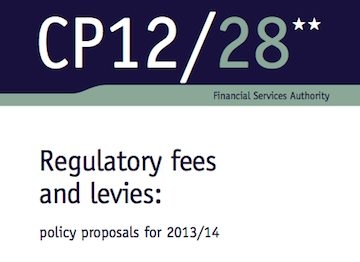The paper 'CP12/28 Regulatory fees and levies: policy proposals for 2013/14' informs advisers that the income threshold for paying the minimum regulatory fees will be £100,000.
This would apply to fee blocks A12 advisory arrangers, dealers or brokers holding client money, A13 advisory arrangers, dealers or brokers not holding client money and A14 corporate finance advisers.
Under the current system, firms only pay the minimum fee if they have one or none Appointed Persons. At present, this is about 35 per cent to 43 per cent of firms. With the new £100,000 income threshold, this figure would increase to 38 per cent to 46 per cent of firms.
The FSA said: "Setting the minimum fee threshold at £100,000 preserves the overall proportion of firms paying minimum fees only and keeps most of the existing firms under the threshold. Some firms will undoubtedly see sharp increases in fees, but, while no doubt unwelcome, they should be affordable in relation to income generated by activity.
The FSA expects two thirds of firms currently under the minimum income threshold to remain there.Firms with lower than average incomes per AP are more likely to see their fees decrease while firms whose income per AP is higher than average will see an increase.
Income per AP may be affected by the target market of the business, size of transactions dealt with and efficiency of individual APs.
The FSA said: "We do not underestimate the concern that large and sudden increases in fees may cause firms, but we believe that the amounts are in absolute terms affordable in relation to their incomes, and that income measure provides a more equitable distribution of costs of regulation."
Responses to the consultation paper will be accepted until 7 January 2013.
• Want to receive a free weekly summary of the best news stories from our website? Just go to home page and submit your name and email address. If you are already logged in you will need to log out to see the e-newsletter sign up. You can then log in again.

